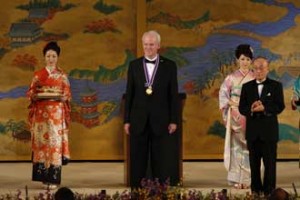
Philosopher says he is “deeply moved”
By Neale McDevitt
Charles Taylor, Professor Emeritus in McGill’s Department of Philosophy, was presented with a prestigious Kyoto Prize during a ceremony in Kyoto, Japan on Nov. 10. The Kyoto Prizes are Japan’s highest private awards for lifetime achievement and are given to individuals who have made dramatic progress in areas promising long-term benefits to humanity.
Taylor was one of three recipients this year, along with computer scientist Dr. Richard Manning Karp and molecular biologist Dr. Anthony James Pawson. Each laureate received a diploma, a 20-karat gold medal, and a cash gift of 50 million yen (approximately US$500,000) in recognition of lifelong contributions to society.
A longtime advocate for multiculturalism and communitarianism, Taylor envisions a world in which diverse, heterogeneous cultures can live together peacefully through mutual recognition. During the presentation, he was praised for “the construction of a social philosophy to pursue the coexistence of diverse cultures.”
In his acceptance speech, Taylor said he was both “deeply moved” by the honour and humbled “to see my name alongside some of the great thinkers who have received this prize in the past.”
Taylor also praised Dr. Kazuo Inamori, President of the Inamori Foundation, for founding the Prizes in 1985 with the belief that “we on earth have no higher calling than to serve the greater good of humankind and society.”
“The consciousness out of which Dr. Inamori’s declaration arises is similar to that which produced in 1948 the Universal Declaration of Human Rights,” said Taylor. “Our ultimate allegiance is not to a single society, but to the whole species, and beyond this to the planet in which it can alone thrive.”
Speaking on the eve of Remembrance Day, Taylor spoke of the failure of democracy and human rights to spread as widely as many had hoped following WWII, despite the lessons gleaned from the horrific conflict. Even more damning, however, has been the way in which new-found freedom has often spawned many of the world’s most heinous atrocities. “The dawn of freedom and popular rule has often been accompanied with unprecedented forms of ethnic cleansing rather than by the peaceful adjustment of differences,” said Taylor.
“The nature of democratic rule,” continued Taylor, “Forces us to build a new sense of unity in a population of diverse cultures and religions. And this in turn requires that today’s democratic peoples transform and redefine their sense of collective identity in order to give due place and recognition to the diversity which has come to be within them.”
